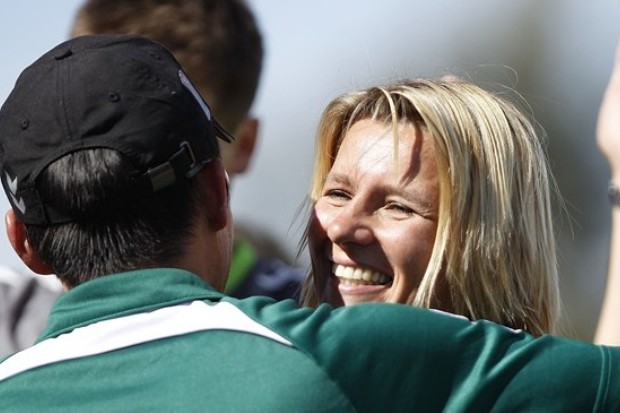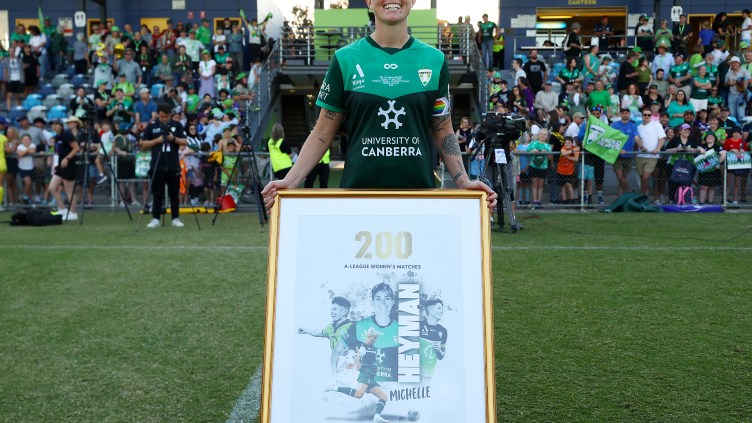The quantity of female coaches succeeding in the women’s game are still comparatively modest but 2012 has already seen a hitherto unknown added to that steadily growing list.
The quantity of female coaches succeeding in the women-s game are still comparatively modest but 2012 has already seen a hitherto unknown added to that steadily growing list. Czech tactician Jitka Klimkova rose from relative obscurity to, not only secure the job at Australian W-League side Canberra United, but take her new team through an undefeated season to a maiden title.
Despite a relatively modest profile, Klimkova has now accrued a wealth of coaching experience. After a lengthy career as a defender for Slovacko Zeny (previously known as Compex Otrokovice), and briefly for the national team, Klimkova became assistant coach to the Czech U-17 team and then head coach of the U-19 national team. This was followed by a long stint coaching Slovacko in the Czech top flight, before she decoded to make her move Down Under last year.
The manner of her approach has impressed as much as the perfect set of results with Canberra. The unity in the squad throughout the season has been apparent, as has the players- willingness to buy into Klimkova-s coaching philosophy. The Czech is now set to return for another stint at Canberra, but she admits that her aim is to one day manage her native country.
Capital idea
Klimkova first came to the attention of Canberra United thanks to a chance meeting at the FIFA Women-s Football Symposium after the 2011 FIFA Women-s World Cup™. The serendipitous moment in Frankfurt proved to be as fortuitous for Klimkova as it was for Canberra United, and the pair have not looked back.
The team from the nation-s capital had been competitive in the first three seasons of the W-League, without ever really threatening Brisbane Roar and Sydney FC-s seemingly unshakeable grip on the competition. Yet with a similar playing roster to the previous season, Canberra were never headed throughout the 12-round season, before remaining undefeated in the finals to take the crown for the first time.
“My motto in my life is have a dream, make a plan and go for it,” Klimkova told FIFA.com. “I had a dream and I really wanted to do my best in the league. I was meticulous in my planning back home before the season started which was important.”
Canberra-s team success was unprecedented and personal success followed with the 37-year-old named coach of the year, while Sally Shipard was named the league-s best player with potent striker Michelle Heyman topping the goalscoring chart.
“I was surprised how great people are in Canberra, and also what great players are in Canberra,” said Klimkova in fluent English, despite apologising for her ‘Czechlish-. “I started to believe dreams could become true. My time in Canberra couldn-t be better.”
“I love attacking style and scoring goals. I think the girls really liked that. Also it is about enjoying our time together,” says Klimkova, explaining her coaching values.
Aside from being recognised at the annual awards, Klimkova-s success achieved plaudits from a variety of quarters, with Australia coach Tom Sermanni effusive in his praise. “From day one Jitka-s personality, enthusiasm and coaching skills created an environment of trust, respect and belief amongst the Canberra players,” he said.
Czech-mates
Klimkova is unequivocal when asked about ambitions. “I would really like to coach the [Czech] national team,” she says. The Czechs currently still harbour realistic ambitions of reaching next year-s UEFA Women-s EURO 2013 in Sweden via the play-offs, although they currently trail Denmark and Austria. “I really hope the team can qualify because it would help Czech football a lot,” said Klimkova. “Then young girls can see the future and hopefully more girls will take up the game.
So is there room for much growth in Czech women’s football? “There is still a lot to do. We need more money in the game for promotion, coaches and development. It would be helpful for the league and the national team. A little bit of assistance in each area can make a significant difference to the big picture. However, we do have a good structure, which many countries don-t have. We have big potential.”
Hailing from a family of motor cyclists, Klimkova had little competitive football in her childhood. “Because it wasn-t common for girls to play, I didn-t start competition until I was about 15,” said Klimkova. “But I am really happy that young girls now have the chance to play wherever and whenever they want. That is a major difference to my day and that is important.”





